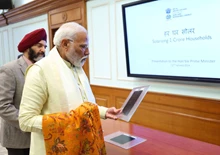
Shankarlal Damor, a farmer from Bamanpada village used to pull a rickshaw in Banswara, a district in Rajasthan, leasing 5 bhiga land five years back. Today, he is a proud cultivator earning around Rs 1.5 lakh annually by multiple cropping of wheat, rice, and moong along with seasonal vegetables using organic farming methods.
Shankarlal's elder son worked as an agricultural laborer in Gujarat, where he acknowledged that even an average land can reap good output. In 2020, he started farming again in his village.
Shankarlal interacted with Vaagdhara, a voluntary organization working in that area, and attained technical guidance about seeds. He was also linked with the agricultural welfare scheme to access knowledge and funding support. The typical agricultural practices based on high input costs with the use of high-yielding varieties of seeds, fertilizers, and pesticides, there was no substantial gain.
Shankarlal informed his son that he would always be in debt unless he changed the practice of cultivation and attempted natural farming methods as advised by the workers of Vaagdhara.
With Shankarlal’s prior experience in natural farming. They started with tree plantation- guava, mango, banana, and sugarcane in and around their farmland. Vaagdhara experts invited Shankarlal and other farmers like him to build their capacity on preparing bio-fertilizers- Jeevamrut, Bijamrut, etc. Along with training on vermicomposting, he was also provided with a Vermi bed.
The family’s hard work resulted in a huge demand for their produce; people come and buy his produce right from his field before it reaches the local market. According to him, their input cost has reduced considerably due to the reduction in the use of fertilizers and pesticides. Annual production of organic wheat is 25 quintals, for paddy, it is 10 quintals, and for vegetables & fruits like brinjal, guava, tomato, etc., is more than 20 quintals. The dream of Shankarlal is to educate more and more people to adopt natural farming and motivate people to plant trees.
There is a need for the promotion of natural farming with small and marginal farmers to safeguard them from natural calamities, and pest attacks and to help them earn a sustainable income from agriculture. Production of organic fertilizers and pesticides marketed by various companies is very expensive. There is a need for mass production at the village level by the farmers’ collectives or women's groups who were traditionally managing the protection and germination of seeds, and preparation of organic manure.
The Gram panchayats will have to play a facilitative role by providing public space for such activities as well as providing incentives to those families willing to shift to organic farming. There is a need to build effective market linkages for the sale of organic produce in the market with higher prices and greater appreciation of the efforts of the farmers.











